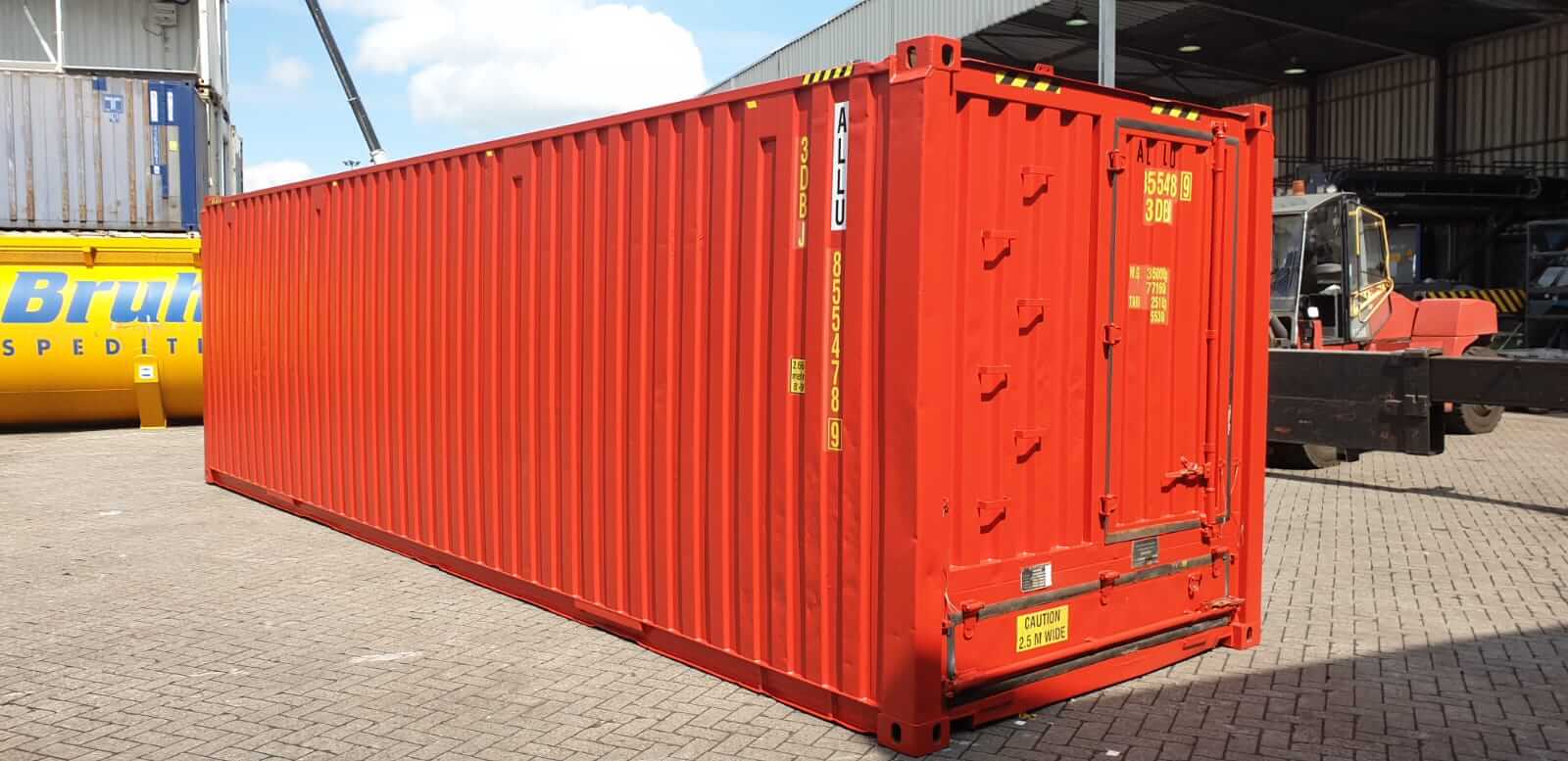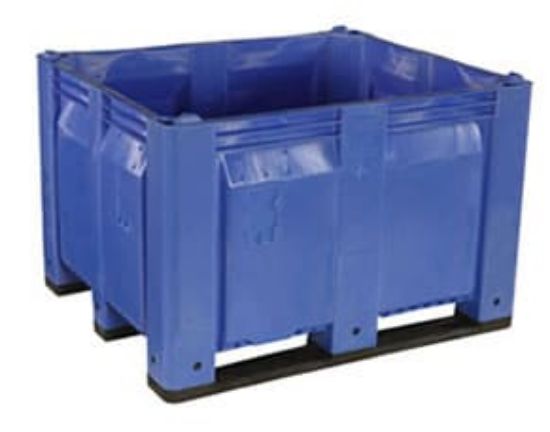Learn why refurbished bulk containers are preferred by logistics and storage experts
The Ultimate Overview to Picking the Right Mass Containers for Your Organization Demands
Choosing the proper bulk containers is critical for any kind of service that depends on effective logistics. Different kinds of containers exist, each created for specific products and applications. Variables such as size, product compatibility, and governing standards play a substantial duty in this decision-making procedure. Comprehending these aspects can result in enhanced functional efficiency. However, several organizations forget necessary elements that could boost their total performance and sustainability. What are these factors to consider?
Comprehending Various Sorts Of Bulk Containers
Mass containers offer as vital devices for services seeking effective storage space and transportation services. These containers come in various kinds, each designed to meet details operational demands. One usual kind is the intermediate mass container (IBC), which is perfect for fluid and granulated materials, offering a balance of capability and ability to move. One more preferred option is the bulk bag, or FIBC, appropriate for completely dry, flowable items. These flexible containers are light-weight and can be easily transferred and kept. For heavier materials, rigid mass containers are typically used, providing toughness and stability for secure handling. Furthermore, there are specific containers customized for unsafe products, ensuring conformity with safety policies. Understanding the unique characteristics of these bulk container types enables services to make informed choices that maximize logistics and decrease costs. By selecting the appropriate container, business can enhance their operational effectiveness and simplify their supply chain procedures.
Key Material Considerations for Mass Containers
When picking mass containers, it is vital to contemplate the products utilized in their building and construction. Variables such as strength, sturdiness, and chemical compatibility play an important function in making certain the containers meet specific operational demands. Additionally, weight and transportability worries can impact both efficiency and transport logistics.
Product Durability and Toughness
Longevity and stamina are critical consider picking materials for bulk containers, as they straight influence the container's capability to endure numerous ecological conditions and taking care of processes. Products such as high-density polyethylene (HDPE), polypropylene, and stainless steel are commonly preferred for their durable buildings, using resistance to temperature level, abrasion, and effect variations. The option of product also influences the total life-span of the container; more powerful products usually cause much less constant replacements, bring about set you back financial savings gradually. Furthermore, the weight of the product can influence shipping expenses and ease of handling. Companies should consider their specific operational settings and the possibility for deterioration to ensure peak toughness and toughness in their bulk container choice.
Chemical Compatibility Aspects
Understanding chemical compatibility is crucial for picking mass containers, as the materials utilized should resist the particular compounds they will hold. Different factors affect compatibility, consisting of the chemical nature of the materials, temperature level, and duration of storage. For example, harsh chemicals might need containers made from stainless-steel or specialized plastics that stand up to destruction. Furthermore, responsive compounds can create warm or gases, requiring vented or pressure-rated containers. The selection of container material, whether polyethylene, polycarbonate, or steel, must line up with the chemical residential properties of the saved compounds to stop breaches or leaks. Inevitably, an extensive analysis of these compatibility elements guarantees safe handling and storage space, shielding both workers and the environment while preserving item integrity.
Weight and Transportability Concerns
Selecting bulk containers involves not only examining chemical compatibility however additionally considering weight and mobility. Businesses need to examine the ease of handling and transportation to optimize efficiency. Light-weight products like high-density polyethylene (HDPE) or light weight aluminum can assist in less complicated motion and reduce shipping prices. Conversely, larger containers might offer boosted durability however can hinder flexibility, especially in environments needing constant relocation. Furthermore, the style of the container ought to permit practical training and stacking, guaranteeing ergonomic security for employees. Firms should additionally think about the facilities readily available for transport; as an example, containers compatible with forklifts or pallet jacks can simplify operations. Ultimately, the right balance in between weight and mobility straight affects functional effectiveness and price effectiveness.
Sizing Your Bulk Containers for Optimal Performance
When sizing mass containers, companies must meticulously assess the dimensions called for to suit their certain products. Additionally, weight capacity is a vital aspect that influences effectiveness and security throughout transportation and storage space. Reliable sizing not only makes best use of room however also enhances operational operations.
Determining Container Dimensions
Picking the appropriate dimensions for bulk containers is essential for optimizing performance in storage and transportation. Businesses should examine their particular demands, taking right into account variables such as offered space, the nature of the goods being saved, and the approaches of transport made use of. Accurate Learn More measurements assure that containers fit preferably in lorries and storage facilities, reducing squandered area and decreasing taking care of time. Requirement dimensions can supply comfort, but customized dimensions could be necessary for distinct demands or to accommodate certain items. In addition, it is essential to review piling abilities and ease of access, as these factors affect overall operational effectiveness. Inevitably, the best dimensions cause improved organization and streamlined logistics, profiting the general efficiency of the business.
Weight Capability Considerations
Understanding weight capability is essential for businesses aiming to maximize their bulk container efficiency. The weight capacity of a container directly impacts storage abilities, transport logistics, and total functional prices. Picking containers with the ideal weight limits guarantees that services can securely save and move their goods without taking the chance of damages or conformity concerns. Straining containers can lead to structural failings, while underutilizing capacity cause squandered sources. When selecting containers, it is important for companies to examine their product weights and take into consideration any governing needs. Furthermore, variables such as the sort of material, meant use, and ecological conditions must additionally affect weight capability decisions. By assessing these components, companies can enhance effectiveness and assure a structured supply chain.
Regulative Conformity and Safety Standards

Governing conformity and safety criteria play an important duty in the choice of bulk containers for services. Organizations has to ensure that their containers fulfill different laws set by neighborhood, national, and international authorities. These requirements frequently relate to material safety and security, architectural integrity, and appropriate labeling, which assist prevent mishaps and assure the safe transportation of products.
In addition, adherence to industry-specific guidelines, such as those from the Food and Medication Administration (FDA) or the Occupational Safety And Security and Health Administration (OSHA), is crucial for firms handling hazardous products or food. Non-compliance can result in fines, legal concerns, or damages to an organization's online reputation.
Organizations ought to additionally consider the container's compatibility with the materials being kept or transported to stay clear of contamination or chemical reactions (used plastic containers). To summarize, recognizing and carrying out governing compliance and security criteria is crucial for the reliable and accountable use bulk containers
Sustainability Options for Eco-Friendly Bulk Containers

Companies are likewise checking out alternatives made from recycled materials, which not only save resources but additionally sustain the reusing sector. Moreover, innovations in design permit lighter containers that need much less energy to transport, better boosting sustainability. By integrating these find more information eco-friendly mass container options, businesses can show their dedication to ecological stewardship while meeting consumer need for sustainable practices. This change not only helps the earth however can also improve brand name track record and customer commitment.
Cost-Effectiveness and Budgeting for Bulk Containers
While many businesses focus on sustainability, cost-effectiveness continues to be a critical factor when picking bulk containers. Organizations must examine the first purchase price, in addition to long-lasting operational prices, to assure economic feasibility. Aspects such as longevity, reusability, and maintenance play a substantial duty in figuring out general expenses.
Purchasing high-grade containers might yield greater in advance prices however can bring about cost savings through lowered replacement prices and decreased waste. Furthermore, services must consider transportation prices and storage space efficiency, as these can affect the total budget plan.

Frequently Asked Inquiries
How Do I Establish the Right Container for Hazardous Materials?
To determine the best container for dangerous materials, one have to assess compatibility with the compound, consider the container's material, look for regulatory compliance, and examine capacity and safety and security features to assure correct handling and storage space.
Can Bulk Containers Be Customized for Particular Products?
Yes, bulk containers can be find out here now personalized for certain items. used collapsible bulk containers. Different attributes, such as dimension, layout, and product, can be customized to fulfill unique requirements, making certain optimal security and effectiveness for transporting and saving different products
What Is the Ordinary Lifespan of Various Mass Container Types?
The typical life expectancy of mass container kinds varies; plastic containers last 5-10 years, metal containers 10-20 years, and wood containers generally last 3-7 years, relying on usage, maintenance, and environmental conditions.
Exactly how Should I Clean and Maintain Mass Containers?
To clean and maintain bulk containers, one should on a regular basis check for damage, remove deposit, laundry with appropriate cleaning agents, rinse extensively, and assurance appropriate drying out before storage. Adhering to manufacturer standards improves long life and safety during use.
Exist Rental Options for Mass Containers Available?
Yes, many companies provide rental options for bulk containers, giving flexibility for organizations. These services can suit various demands, permitting business to handle stock efficiently without the dedication of purchasing containers outright.
Longevity and toughness are essential aspects in picking materials for bulk containers, as they straight influence the container's capacity to withstand different environmental conditions and handling procedures. Understanding chemical compatibility is important for picking mass containers, as the materials made use of need to resist the details compounds they will certainly hold. Comprehending weight ability is crucial for companies intending to optimize their bulk container effectiveness. Regulative conformity and safety and security criteria play a necessary role in the selection of bulk containers for services. While many businesses concentrate on sustainability, cost-effectiveness continues to be an important variable when picking mass containers.